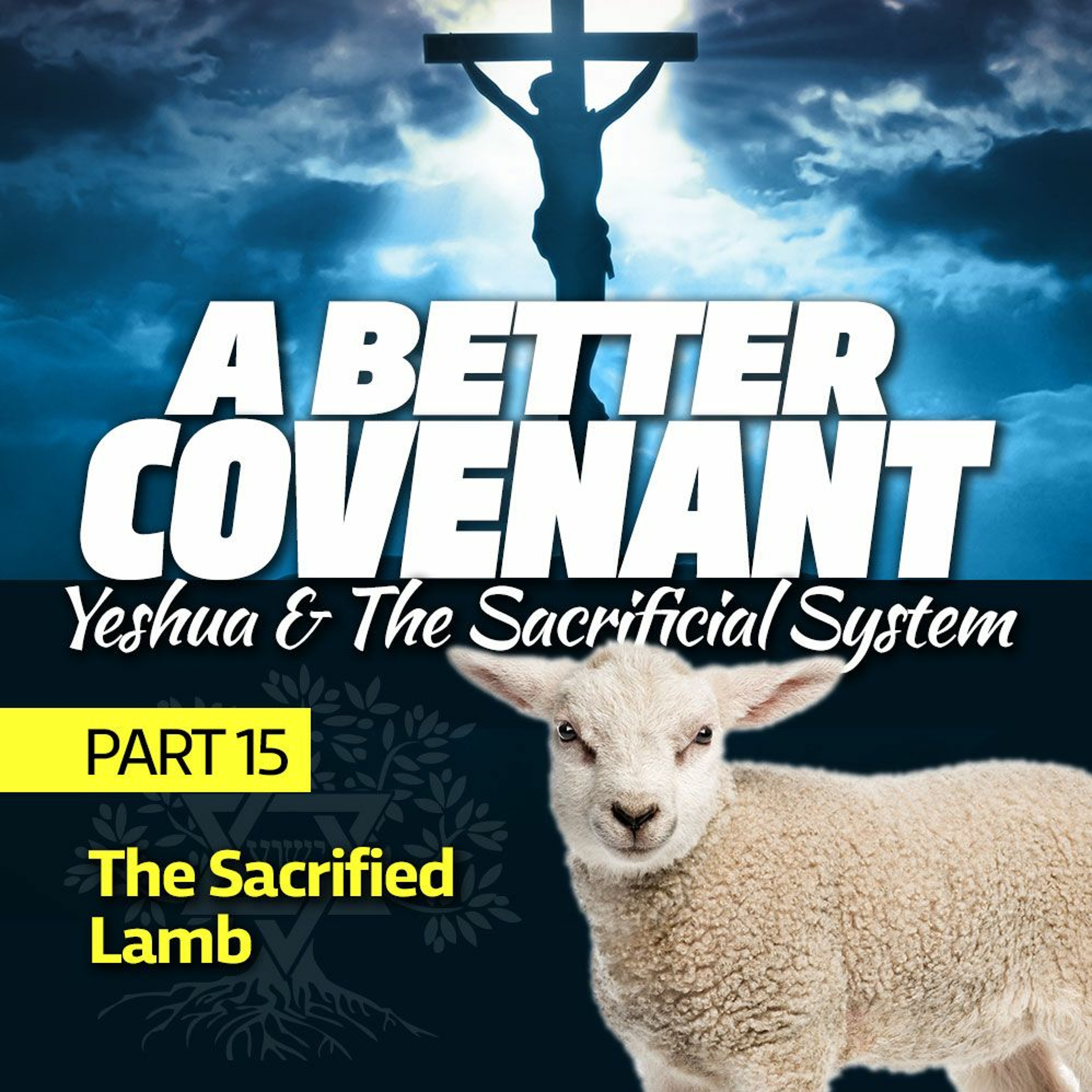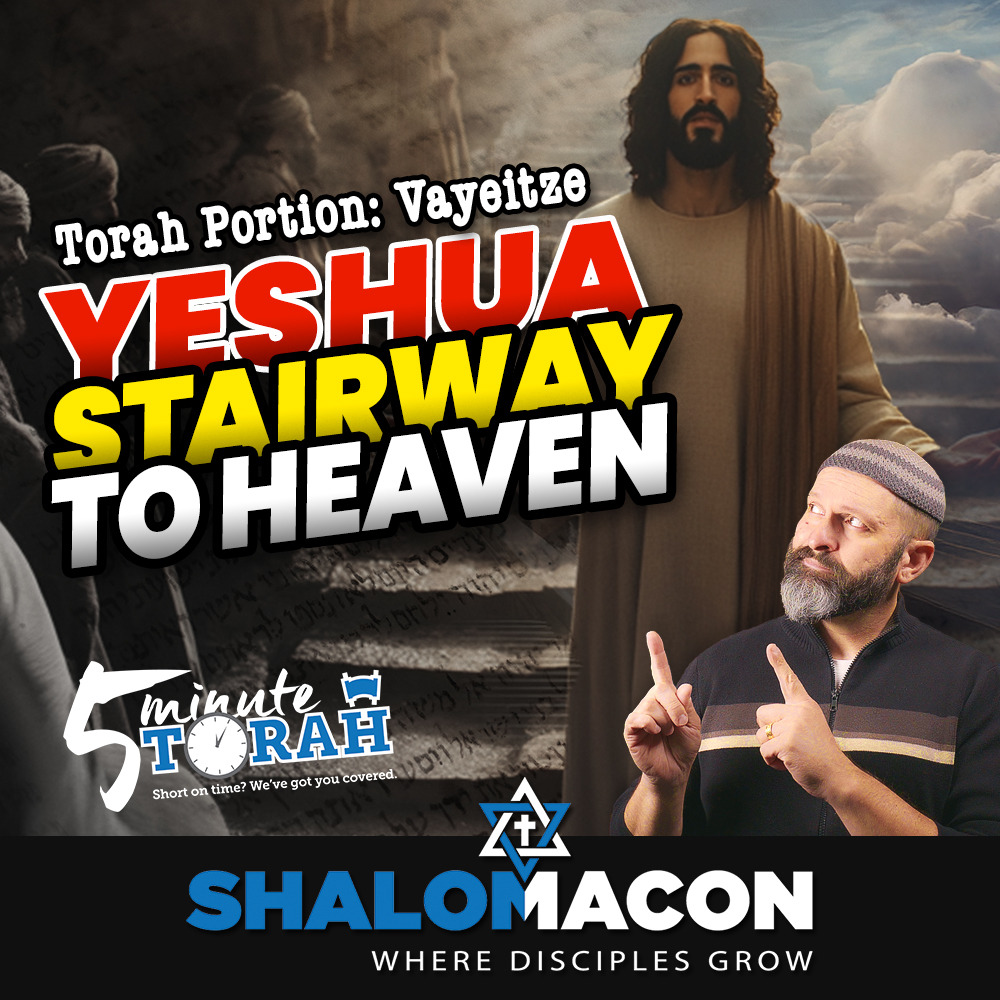Episode Transcript
[00:00:02] Show me your glory.
[00:00:04] Show me your glory. This is a phrase that many of us have spoken as we wholeheartedly chase after the Lord. But have you ever asked for something without realizing the repercussions of what you were asking? What is God?
[00:00:32] This is a phrase many of us have hello.
[00:00:37] This is a phrase many of us have spoken as we wholeheartedly chase after the Lord. But have you ever asked for something without realizing the repercussions of what you were asking? What has God?
[00:00:53] What does seeing G D's glory entail? Should we be asking for this? If you're wondering the same thing, then join me as we explore this concept in this week's five Minute Torah Shalom and Blessings from Shalom Macon, the place where disciples of Yeshua learn, connect and grow. I'm Darren and before I get into the five minutes of my five Minute Torah commentary, let's cover a few quick facts facts about this week's Torah portion. This week we are studying the last portion in the Book of Exodus, the portion of Pekudei Exodus 38:21 through 4038 and here are the three things that you need to know about it. Number one job well done. Completion of the Tabernacle the completion of the Tabernacle let's go back and do that again.
[00:01:39] Whoa. What happened there?
[00:01:50] Number one A job well done. Completion of the Tabernacle the completion of the Tabernacle marks the culmination of God's instructions given to Moses on Mount Sinai. This moment signifies not just the physical completion of a structure, but the spiritual fulfillment of a divine mandate. The detailed execution of God's commands down to the precise materials and measurements for the Tabernacle and its furnishings reflects the Israelites obedience and dedication to their covenant with their God. At each stage of construction, we are reminded that the Israelites completed their task as the Lord commanded Moses. Now that the Tabernacle was complete, there was a tangible physical structure that served as the dwelling place for the Divine Presence.
[00:02:41] Number two Open for business. The Service Begins the inauguration of the Tabernacle marked the beginning of the regular worship service.
[00:02:50] Nope.
[00:03:03] Number two Open for business. The service begins the inauguration of the Tabernacle marked the beginning of the regular worship and sacrificial services of the Tabernacle. But before that could happen, all of the components of the Tabernacle and its furnishings, along with the kohanim or priests, had to be consecrated. The consecration of the Tabernacle allowed it to function as the abode of the Most High God and the consecration of Aaron and his sons as Kohanim allowed them to begin their holy service of mediating between God and Israel. The elaborate rituals of consecration, including sacrifices, anointing with oil, and the donning of sacred garments, etc. Reveal the level of sanctity associated with their roles and the meticulous attention to detail that was required to serve them in the presence.
[00:03:57] The elaborate rituals of consecration, including sacrifices, anointing with oil, the donning of the sacred garments, etc. Revealed the level of sanctity associated with their roles and the meticulous attention to detail that was required to serve in the presence of a holy God. From that point forward, this holy abode would serve as the connecting point between heaven and earth and be at the heart of all that God desired to do for his people and Number three the Shekhinah the Continual Presence of God the Tabernacle was unique among all things made by human hands. It was the tangible manifestation of God's presence among his people. It served as a constant reminder that God dwelt among them, guiding and protecting them on their journey. This presence was symbolized by the cloud covering the Tent of Meeting and the glory of the Lord filling the Tabernacle. See Exodus 40, verses 34 and 35. This divine presence is known in Rabbinic literature as the Shekhinah, which literally means dwelling and represents a closeness between God and His people. When God's presence inhabited the Tabernacle, the Israelites experienced the zenith of their covenantal relationship that was established with them at Sinai.
[00:05:14] This Week's Tom and Terry this week's Torah commentary is called Show Me youe Glory and comes from a book, 5 Minute Torah, Volume 3.
[00:05:26] If you've been keeping up with the Torah readings, you know that the portion of Pickle Day is the final, final reading for the Book of Shemote or the Book of Exodus. The book concludes by telling how the creation of the Mishkan, or Tabernacle was fulfilled in detail, including all of the vessels, utensils, the priestly garments, etc. Everything was ready for opening day. The tabernacle was ready to be put into use. Over the next several verses, we learn the details of what was involved in doing this and how Moses set everything up to prepare the tabernacle for use. Once the details are laid out, the story reaches its climax when the Kavod, or the glory of Hashem of God filled the tabernacle.
[00:06:08] This is the moment they had all been waiting for. It seems like the ideal condition for Moses to enter the tabernacle be in the Lord's presence and begin ministering to Him. But this wasn't the case. We read, Moses was not able to enter the tent of meeting because the cloud settled on it and the glory of the Lord filled the tabernacle. This is verse 35. Why couldn't Moses enter into the tabernacle to minister to the Lord while his glory was filling it? Let's look at a few other instances that speak of God's glory and see if we can draw any connections to help us understand this. First, at Matan Torah, the giving of the Torah. In Exodus 19, God's presence rested within the top.
[00:06:54] What happened? What happened?
[00:07:10] First, at Matan Torah, the giving of the Torah. In Exodus 19, God's presence rested within the cloud atop the mountain. He revealed himself to the children of Israel on Mount Sinai in order to confirm his covenant and give them his Torah. Evidently, it was a terrifying sight to behold. There was thunder and lightning. A cloud rested on the top of the mountain, and the whole mountain was covered with smoke and trembled. Moses ascended the mountain and received the Torah from God. Even though the cloud rested on the mountain, we do not hear of the glory of God being mentioned in this passage. In Exodus 24, we read about something even more strange. It says, then Moses and Aaron, Nadab and Abihu and 70 of the elders of Israel went up.
[00:08:07] In Exodus 24, we read about something even more strange. It says, then Moses and Aaron, Nadav and Avihu, and 70 of the elders. Ah, come on. Come on, dan.
[00:08:23] In Exodus 24, we read about something even more strange. It says, then Moses and Aaron, Nadav and Avihu, and 70 of the elders of Israel went up and they saw the God of Israel. They beheld God and ate and drank.
[00:08:41] They beheld God and ate and. And drank. This is Exodus 24, verses 9 through 11. Somehow they were able to do what no one else could do. They were able to gaze upon God and not die. God's glory, however, is distinctly absent from this encounter. Nevertheless, directly after this encounter, God calls Moses to the top of the mountain to receive the stone tablets with the big ten engraved on him, along with a host of other commandments. We read, the glory of the Lord dwelt on Mount Sinai, and the cloud covered it six days. And on the seventh day, he called to Moses out of the midst of the cloud. This is Exodus 24:16. After describing the glory of God as a consuming fire on the top of the mountain, it says that Moses entered the cloud and stayed on the mountain for the next 40 days and nights verses 17 and 18 we learn from this passage that although the cloud persisted, the Lord's glory only resided on the mountain for six days. Moses was called into the cloud on the seventh day only after the glory of God had withdrawn. The most revealing passage in the Torah is the most revealing passage in the Torah is in Exodus 33 when Moses makes a request from God. He says, please show me your glory. Verse Verse 18 When God replies, he basically tells Moses that he can't handle the most revealing passage in the Torah is in Exodus 33 when Moses makes a request from God. He says, please show me your glory. This is verse 18 when God replies He basically tells Moses that he can't fulfill his request because Moses couldn't handle it. He would, however, at least fulfill Moses request in part. From this we learn something very interesting from the Lord's response. He says, you cannot see my face, for man shall not see me and live. He says, you cannot see my face, for man shall not see me and live.
[00:10:56] From this we can learn that God specifically links seeing his glory to seeing his face. It seems that truly seeing God's glory is to see his face. Evidently, in each of these previous passages there is a more Evidently, in each of these previous passages, there is more of an awareness of God's glory than an actual being.
[00:11:27] Evidently, in each of these previous passages, there is more of an awareness of God's glory than anyone actually being able to see it. Moses and the children of Israel appear to be able to sense it rather than directly encounter it. Because it seems that if anyone does actually see or experience God's true glory, the result would be devastating. Our physical bodies in their present state are not just a our physical bodies in their present state are just not equipped to handle such a jolt of spiritual power. Rabbeinu Bahia, commenting on this passage in Exodus 33, Rabbeinu Bahia, commenting on the passage in Exodus 33:18, agrees. He says that although Moses wanted to experience the fullness of God's glory in his life, God could not grant his request so long as he existed in his physical body. Therefore, he had to shield Moses and only allow him a glimpse of his true nature. There are many popular songs whose lyrics are focused on revealing His There are many popular songs whose lyrics are focused on God revealing His glory. The writers long to see the glory of God manifest on this earth. But just like children, sometimes we ask the Lord for things we think we want or need, but we really don't understand the magnitude or the reflection. Repercussions of our request. As we've seen, experiencing God's glory isn't something we can even withstand. Rather than saying, show me your glory, maybe we should be saying, let me sense your glory. Maybe then we would tremble before Holy God and be moved toward true faith and repentance. Well, if you want to keep learning, then I've got the perfect suggestion. It's traditional to study the text of Perkei Avot between Passover and Shavuot. I've created a series that connects Per Kevot with the teachings of Yeshua, and it helps us to understand his teachings better in their Jewish context. Why not get a head start on your studies and check out my series and the teachings of Yeshua? Just click on the link right here to get started.



